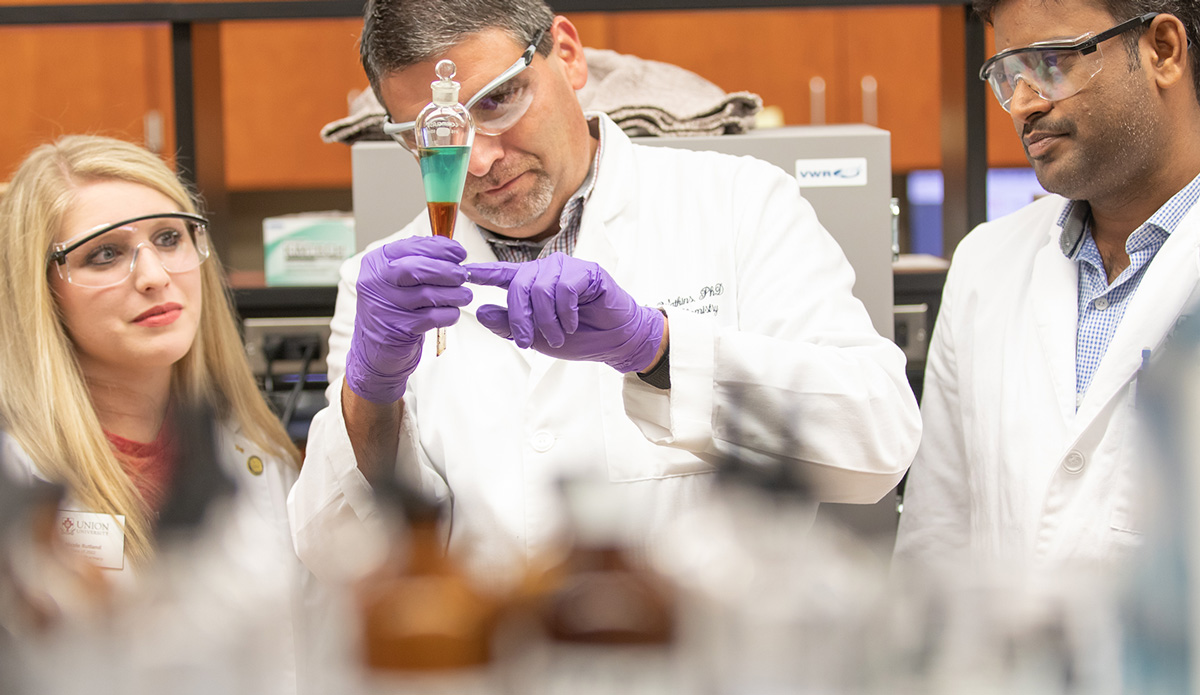Pharmaceutical Sciences
 Students in the Pharm.D. program at Union University have the opportunity to participate alongside faculty in a variety of research endeavors. We have designed a curriculum that allows students, not only the opportunity but also the time to participate in lab-based or pedagogical/educational research. Although, a relatively small liberal arts university, Union University has invested significantly in the acquisition of state-of-the-art research equipment including a Waters UPLC-MS system and a 400 MHz Bruker NMR, both equipped with autosampler technology.
Students in the Pharm.D. program at Union University have the opportunity to participate alongside faculty in a variety of research endeavors. We have designed a curriculum that allows students, not only the opportunity but also the time to participate in lab-based or pedagogical/educational research. Although, a relatively small liberal arts university, Union University has invested significantly in the acquisition of state-of-the-art research equipment including a Waters UPLC-MS system and a 400 MHz Bruker NMR, both equipped with autosampler technology.
Research
Organic/Medicinal Chemistry
Our research operates at the intersection of organic chemistry and medicinal chemistry with the overarching goal of developing new, efficient means of synthesizing small molecules of biological and pharmaceutical interest, using environmentally friendly methods. We are particularly interested in the development of functionalization reactions of activated and unactivated C-H bonds (C-H functionalization reactions). These powerful reactions allow remarkable reaction outcomes under fairly mild conditions, allowing us to prepare compounds of biological importance in fewer synthetic steps.
Pharmacology
Research in Pharmacology involves identifying treatment options for various diseases, in particular, cancer. Anti-cancer drugs generally cause severe adverse effects due to their toxicities and cause high incidence of drug resistance. There is a need for novel therapeutic approaches for better efficacy of cancer treatment with the least adverse effects. Specifically, pharmacology research centers on: understanding the role of antioxidants such as curcumin and resveratrol on cancer treatments, studying the effects of vitamin C on different cancer cell lines, using a combination of anti-cancer drugs with antioxidants for their synergistic effects, and testing new compounds with anti-cancer properties.
Pharmaceutics
Research in pharmaceutics includes studying the stability of compounded formulations, dosage forms and drug delivery systems. This includes a broad perspective of delivering various small molecules and large molecules (e.g. vaccines and proteins) in their most stable form to treat numerous diseases such as inflammation and cancer which have taken a major toll on the human population. This involves creating a delivery platform of formulation and efficient processing of microparticles and nanoparticles for protein pharmaceuticals, controlled-release biodegradable and targetable particle drug delivery systems prepared by one-step spray drying. A long-term research goal is to develop a strategy where a vaccine, when formulated in a delivery vehicle (micro- and nanoparticles with specific excipients/adjuvants) can behave in a desired manner to stimulate the body's immune recognition system and facilitate a long lasting potent memory to a particular disease.
Pharmacometric Research
Pharmacometric research evaluates the results of drug studies, whether in animals or human subjects. The results of these trials are analyzed to create mathematical descriptions of drug concentrations over time, and/or drug effects over time, following the administration of drugs. This research tries to explain this information and to find reasons why one study subject may differ from another. We look for measurable reasons such as body-weight, age, gender, level of kidney and liver function, and even measures of genetic markers which might predict drug levels or effects. With such mathematical understanding, we try to answer important questions regarding patient care, such as what dose should be given to a particular patient or group of patients to maximize the benefits of a drug while limiting its side-effects.
Mathematical descriptions, or models, of the drug properties can also be used to answer questions about the design of future drug studies. Using mathematical models, new study designs can be simulated in a computer to test conditions which haven't been studied in reality. We use these approaches to design better drug studies, so we can get more useful information from fewer subjects and with greater confidence in the results.
Social and Behavioral Research
Social, Behavioral, and Administrative research at Union University encompass diverse areas in the pharmaceutical sciences. Our mission is to advance research, teaching, and service in the areas of appropriate medication use, health outcomes, population health, interprofessional collaborations, and pharmacy management. The primary focus of our research is directed toward the advancement of the public's health through effective communication, health promotion/disease prevention interventions, and practice management. We also provide analytical and bioanalytical support to faculty and students who are engaged in scholarly research within pharmaceutical sciences and health outcomes. Students in the Doctor of Pharmacy Program are afforded opportunities to become involved in various projects as well as provided guidance during their own research endeavors. Union pharmacy students also have the opportunity to present their research at local, national, or international meetings and have their work published in peer-reviewed journals.
Meet the Faculty
 Richard Addo, Ph.D.
Richard Addo, Ph.D.
Professor of Pharmaceutical Sciences
 Lunawati Bennett, MS, MRE, PhD, PharmD, RPh, FACN
Lunawati Bennett, MS, MRE, PhD, PharmD, RPh, FACN
Professor of Pharmaceutical Sciences
 Marlin L. Blane, Pharm.D., J.D.
Marlin L. Blane, Pharm.D., J.D.
Adjunct Professor of Pharmaceutical Sciences
 Andrew Castleman, Pharm.D., MS
Andrew Castleman, Pharm.D., MS
Assistant Professor of Pharmaceutical Sciences
 Nathan Daniels, Ph.D.
Nathan Daniels, Ph.D.
Associate Professor of Pharmaceutical Sciences
 Sean King, M.S., Ph.D.
Sean King, M.S., Ph.D.
Associate Professor of Pharmaceutical Sciences
 Joel S. Owen, Ph.D., R.Ph.
Joel S. Owen, Ph.D., R.Ph.
Adjunct Professor of Pharmaceutical Sciences
 E. Blake Watkins, Ph.D.
E. Blake Watkins, Ph.D.
Chair of Pharmaceutical Sciences and Professor of Pharmaceutical Sciences

